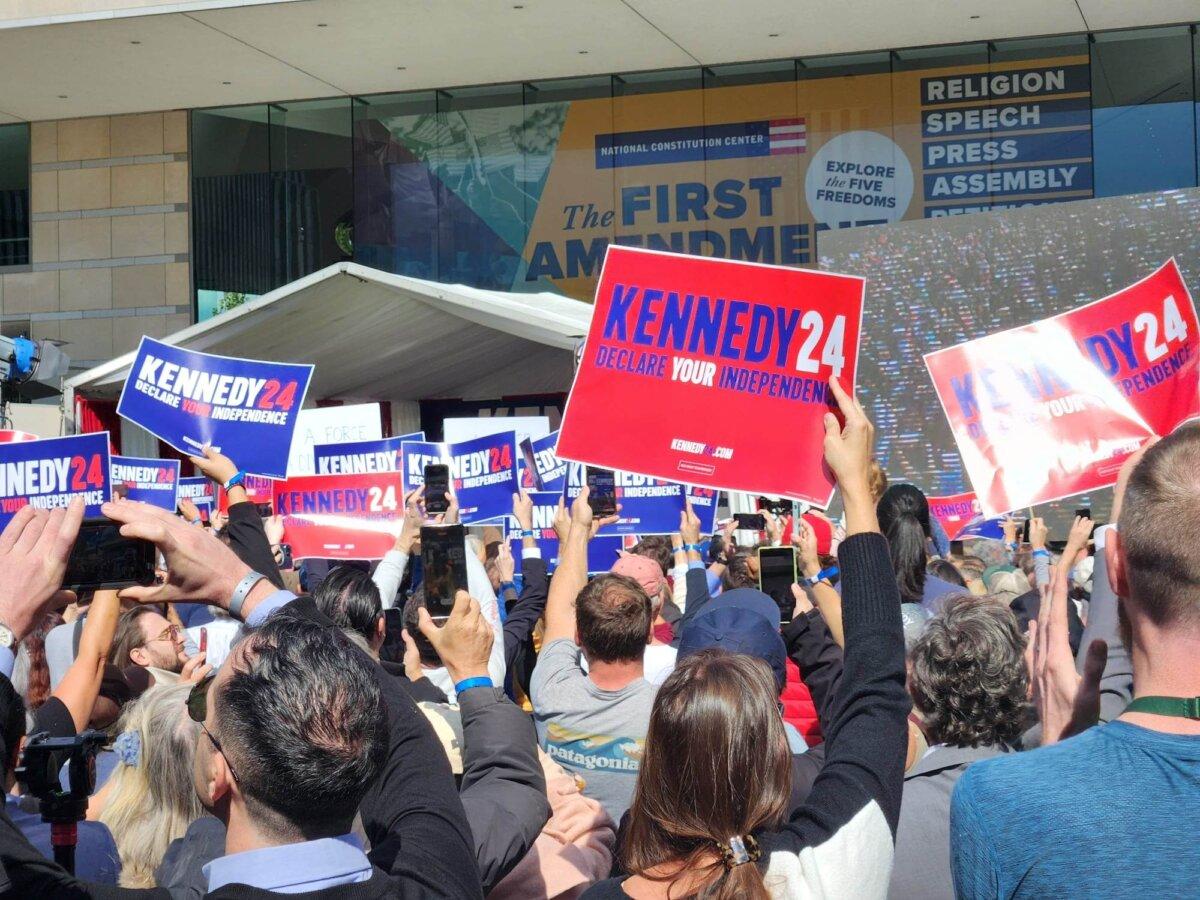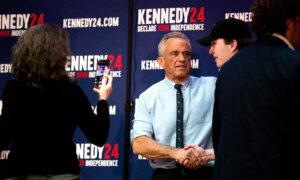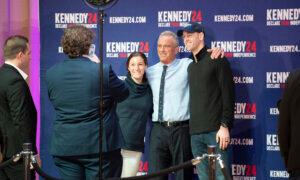The campaign announced it had collected enough signatures to appear on the ballot in Nevada and moved Idaho to extend its filing deadline.
Robert F. Kennedy Jr. envisioned a different Super Tuesday when he announced his candidacy to challenge President Joe Biden for a 2024 White House bid this past April. Instead of campaigning in multiple primaries, the independent presidential candidate continued his quest to get on the general election ballot.
While President Biden and former President Donald Trump celebrated victories catapulting them closer to their parties’ nomination, Mr. Kennedy’s campaign said on March 5 that it had collected enough signatures to appear on the Nevada general election ballot, and it won a lawsuit that challenged Idaho’s “unconstitutional” early filing deadline.
Nevada is considered a key swing state in the presidential election. In 2020, President Biden won the state by less than 35,000 votes over President Trump. Mr. Kennedy’s campaign said it had gathered 15,000 signatures to get on the Nevada ballot.
Multiple national polls have shown that more than half of American voters do not want to see a rematch between Presidents Biden and Trump.
In a Reuters/Ipsos Poll released in late January, 70 percent of the respondents agreed with a statement that President Biden should not seek another term and 55 percent reported they do not think President Trump should run.
The same survey indicated that slightly more than half of the 1,250 adults questioned said they were dissatisfied with the two-party system. Only one in four said they were satisfied.
An NBC News poll published in early February showed that 34 percent of all registered voters said they could see themselves backing Mr. Kennedy while 10 percent said the same of independent Cornel West. That survey included a hypothetical race with President Trump (41 percent), President Biden (35 percent), an unnamed Libertarian Party candidate (5 percent), an unnamed Green Party candidate (5 percent) and an unnamed No Labels candidate (4 percent).
Gaining Momentum
Mr. Kennedy believes those numbers—and polling that indicates he leads all presidential candidates in favorability rating and among independents and voters under 35—show he has a path to victory in November.
“Super Tuesday has concluded. Today marks the end of the primary and the beginning of the general election. A majority of Americans do not want a Trump/Biden rematch from 2020. They want to vote for someone who represents hope and healing. They want to vote for someone with an inspiring vision for America,” Mr. Kennedy wrote on X, the social media platform formerly known as Twitter, on the evening of March 5.
“I look forward to debating Presidents Biden and Trump on the issues that matter most to Americans—from making housing and health care affordable to ending the forever wars and unraveling corporate capture of our government.”
Utah was the first state where Mr. Kennedy qualified to appear on the ballot. In New Hampshire, he also collected more than 5,000 signatures in one day to meet the state’s guidelines for ballot access.
American Values 2024, the super political action committee (PAC) aligned with Mr. Kennedy, updated its website to reflect that the organization has gathered enough signatures for him to appear on the ballot in South Carolina. According to the website, the super PAC has 14,634 signatures, exceeding the minimum of 10,000.
The super PAC announced in late February that it had gathered enough signatures for Mr. Kennedy to appear on the ballot in Arizona and Georgia.
The American Values 2024 website also shows that the group is close to meeting the 30,000-signature minimum in Michigan. The total currently stands at 27,500.

‘We The People’
Mr. Kennedy also qualified for the ballot in Hawaii under the “We The People” party.
In January, Mr. Kennedy announced that his campaign had filed paperwork in six states to create a political party. The move was made to get his name on the ballot in those states with fewer voter signatures than is required for candidates not affiliated with a party.
Mr. Kennedy’s campaign established the “We the People” party in five states: California, Delaware, Hawaii, Mississippi, and North Carolina. The “Texas Independent Party” was also formed.
A statement by Mr. Kennedy’s campaign reported that filing for political party status in the six states reduced the number of signatures required for him to gain ballot access by about 330,000.
In October, Mr. Kennedy announced he would run as an independent, leaving a Democrat presidential primary he said was being rigged by the Democratic National Committee. He told The Epoch Times that he expected legal action from Democrats and Republicans intent on keeping him off the general election ballot, and he said that his campaign would have to file lawsuits related to ballot access. He won his most recent battle on March 5.
Mr. Kennedy filed a lawsuit challenging Section 34-708A of the Idaho Code requiring that independent candidates file nomination petitions with a minimum of 1,000 verified signatures with the Secretary of State’s office no later than March 15.
The legal action cited a case from 1980 filed by then-independent presidential candidate John Anderson. The U.S. Supreme Court ruled that a March 20 deadline imposed by the state of Ohio for independent presidential candidates violated the constitution because it was too early and did not allow voters to learn enough about any candidates other than those in the two major parties.
Federal Judge Lynn Winmill of the U.S. District Court in Idaho notified Idaho Secretary of State Phil McGrane that he would extend the March 15 deadline if the state Legislature did not amend the law.
Other Deadline Fights
Utah had been the first deadline facing the Kennedy campaign until Lt. Gov. Deidre Henderson, a Republican, announced that she would extend the deadline for independent presidential candidates to gain ballot access to March 5.
Mr. Kennedy filed a lawsuit against Utah officials on Dec. 4, 2023, citing an “unconstitutional early filing deadline” that prevented ballot access for independent presidential candidates.
The legal action challenged Utah’s Jan. 8 deadline requiring independent presidential candidates to collect and verify 1,000 signatures from qualified voters.
Mr. Kennedy argued in the lawsuit that “the current deadline is the earliest deadline ever sought to be imposed on independent presidential candidates in the modern era. No federal court has ever upheld a January deadline [for independent presidential candidates].”
Ultimately, though the deadline was extended, Mr. Kennedy’s campaign held a press conference before the Jan. 8 deadline announcing that had met the requirements to appear on the state’s general election ballot.
On Super Tuesday, he reiterated his resolve to appear on every general election ballot.
“I will be on the ballot in all 50 states and the District of Columbia in November! It’s a challenging system running outside the lines of Republican or Democrat channels, but I wouldn’t have it any other way,” Mr. Kennedy wrote on X on March 5. “It’s clear Americans want to break free from the two-party system. Let’s unite around our shared values and get down to business.”
Original News Source Link – Epoch Times
Running For Office? Conservative Campaign Consulting – Election Day Strategies!


